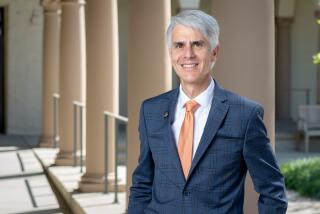Changing of the Guard : Retiring President Ronald P. McArthur helped found the Catholic college.
- Share via
For 20 years, Thomas Aquinas College has been educating its students through the study and discussion of great Western literature, from Plato and Copernicus to Karl Marx and St. Thomas Aquinas himself.
And for every one of those 20 years, through its relocation from Calabasas to its present site just outside Santa Paula, the college president has been Ronald P. McArthur. Tomorrow that changes. Leadership of the college will pass to Thomas E. Dillon, the school’s dean for the past 10 years.
Though the two men are 22 years apart in age, they hold in common a strong desire to furnish students with the sort of classical education for which Thomas Aquinas College has been known since its inception.
You never know who you’ll run into while taking a stroll, and no one knows that better than Ronald P. McArthur. It was a chance conversation with an acquaintance back in the mid-1940s that changed the course of McArthur’s life.
“After the war, I was wondering where to go to college and I ran into a good friend of mine,” the 66-year-old McArthur said. “He had gone to St. Mary’s College before he went in the service and he was telling me I ought to go to St. Mary’s for a good number of reasons.”
McArthur acted on his friend’s advice and went on to graduate from St. Mary’s in Moraga, Calif., and then earned a doctorate in philosophy at Laval University in Quebec. It was at St. Mary’s that he was introduced to classics that reflect Western civilization from 2500 BC to the early 20th Century.
It was this steadfast attachment to the classics that made McArthur and six other St. Mary’s alumni form Thomas Aquinas College. What resulted was a four-year program based entirely on these works, in the areas of literature, theology, philosophy and mathematics.
“We started the school because we thought that education in general was going in the wrong direction, to more and more specialization, to fewer and fewer required courses, that students were not being generally educated,” he said. “And we thought, more particularly, that Catholic schools were losing their sense of purpose.”
Looking back, McArthur said Thomas Aquinas has come farther than he ever imagined. “I thought that it probably couldn’t be founded because the country is so much against this kind of education and the education Establishment itself is opposed to it, by and large,” he said. “But we had a moral obligation to do it.”
Raising the financing to support such an endeavor, he said, has never been easy.
“It’s still very, very difficult to raise money because the college is not very well understood by most people. I would have thought that by now we would have built more buildings, that the college would probably have been larger than it turned out to be.”
While the campus has relocated and grown only slightly over the years, the enrollment has increased about sixfold from the original 32 students to 191 today. What have not changed, said McArthur, are Thomas Aquinas’ methods of teaching, its academic goals and its curriculum, which can be found at only a few other colleges nationwide.
“In order to learn you have to think out things for yourself, and therefore lecturing at people doesn’t really touch their intelligence,” he said.
“To lead students to think for themselves, you have to discuss things with them, let them speak, let them run up against opposition to the things they say, get them to consider what they’re saying, to defend what they’re saying.”
And McArthur said this cannot be done with the use of textbooks, but rather after reading the classic books of Western literature.
“I’ve always thought that unless you can get enough people educated like this you have no hope for maintaining any kind of high civilization. You can’t do it with technicians, you can’t do it with people who are trained. It can only be done when people can think seriously at a relatively significant level. Otherwise society becomes debased.”
McArthur has dedicated himself to fighting for a particular type of education. What would have happened had he not had that fateful encounter with his friend nearly half a century ago?
Reading the classics changed his life, he said. “I went to college to become a lawyer because older men I met in the Army told me that I was somewhat vocal and persuasive and I could probably make a lot of money as a lawyer,” he said.
“I changed my mind when I read the ‘Apology’ of Plato. And I saw then that ideas were important, that what you read about reality made a difference.”
UP CLOSE RONALD P. McARTHUR
Job status: Outgoing president of Thomas Aquinas College after a 20-year tenure.
Next stop: “My wife and I are moving to Arizona right away. The place we’re moving to is in the Sonoran Desert, where it’s so quiet.”
Plans for retirement: “I’ll continue doing things in the measure that I can . . . working with people who want to introduce the great books into their programs and doing whatever else I can as a Catholic in the church.”
Hobbies: Horseback riding, playing tennis and hiking.






